Unit 2 How often do you exercise? Section B 2a-2e 课件(共44张PPT) 2023-2024学年人教版英语八年级上册
文档属性
| 名称 | Unit 2 How often do you exercise? Section B 2a-2e 课件(共44张PPT) 2023-2024学年人教版英语八年级上册 |  | |
| 格式 | pptx | ||
| 文件大小 | 3.9MB | ||
| 资源类型 | 教案 | ||
| 版本资源 | 人教新目标(Go for it)版 | ||
| 科目 | 英语 | ||
| 更新时间 | 2023-09-17 20:33:18 | ||
图片预览

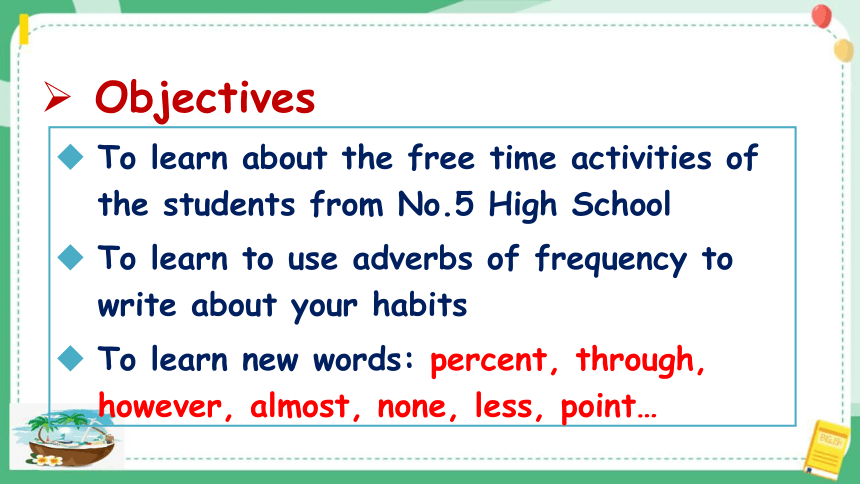
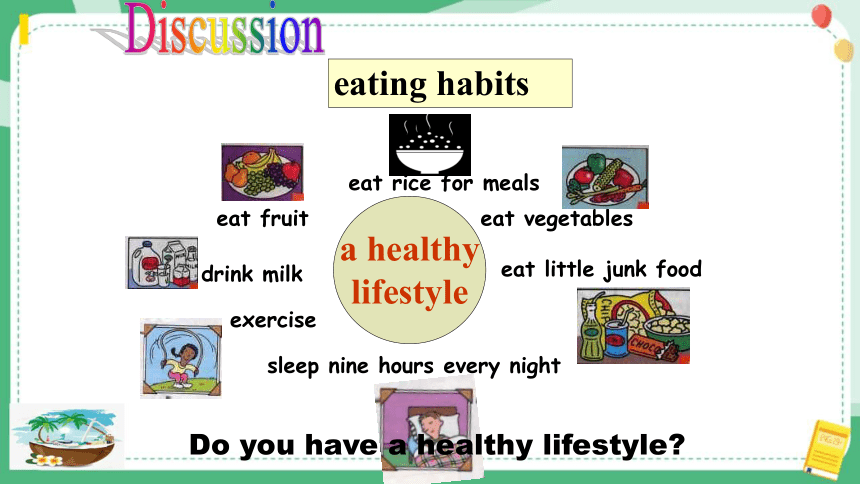
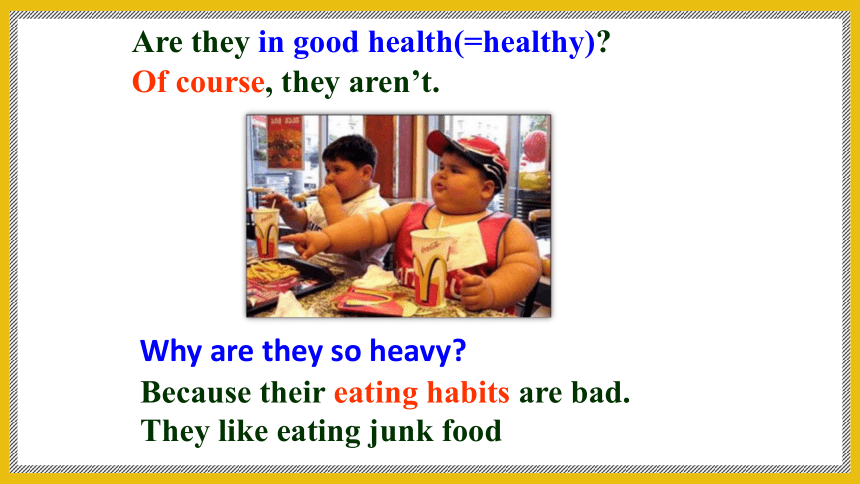
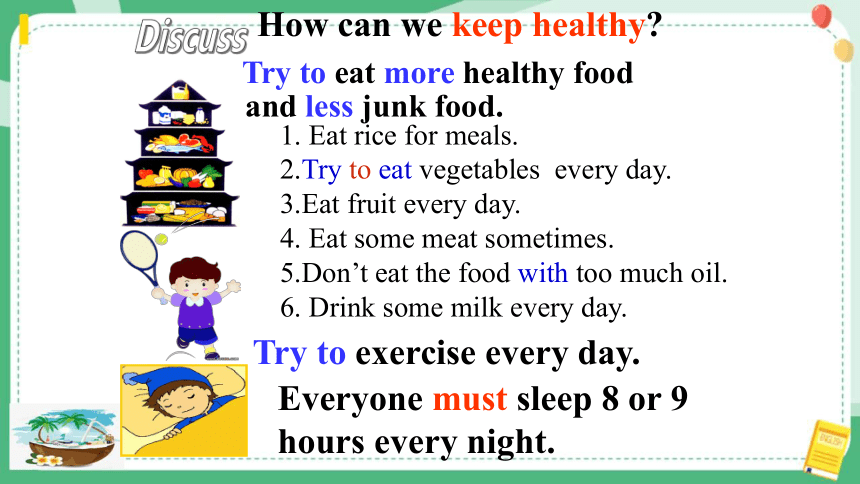
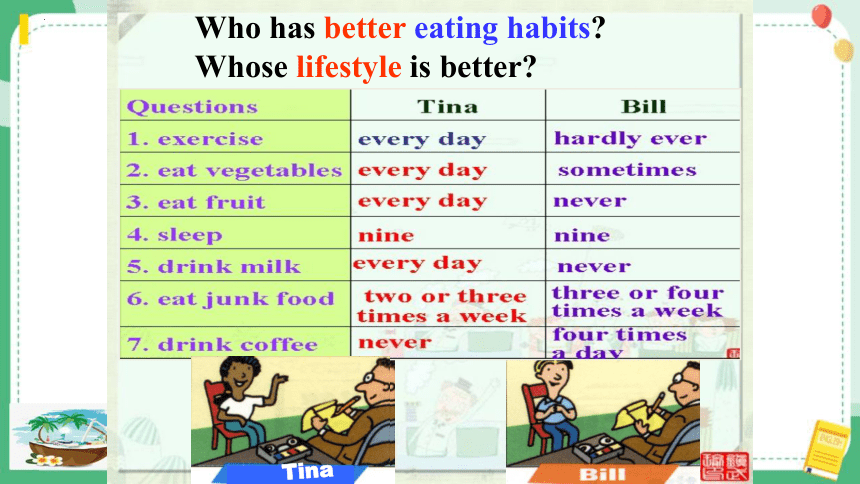
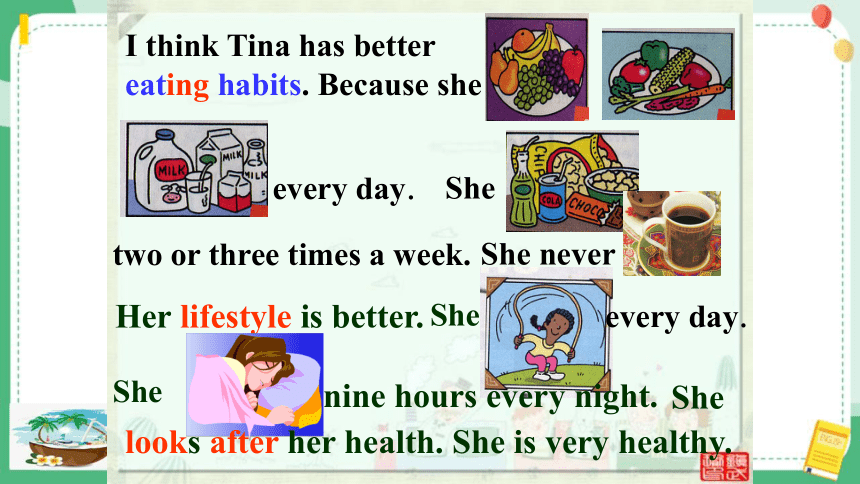
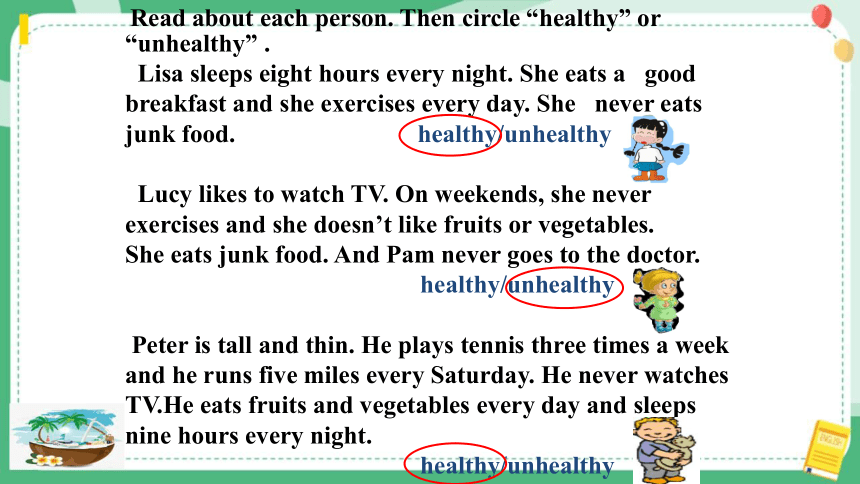


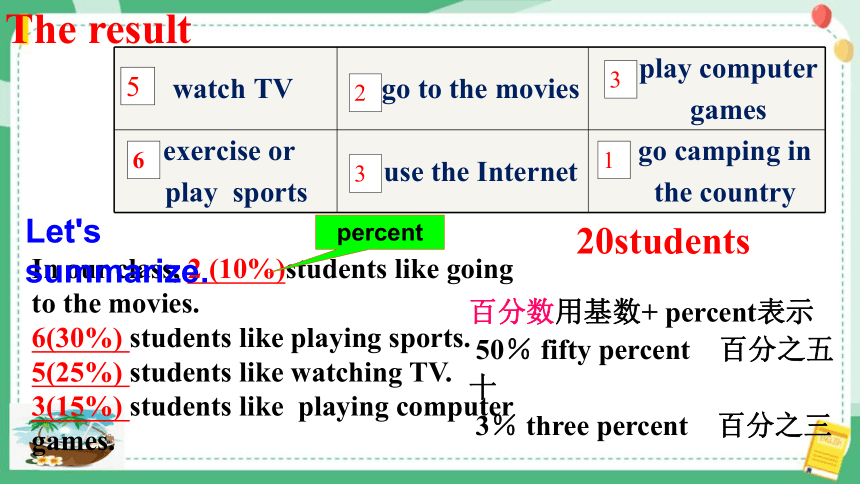

文档简介
(共44张PPT)
Unit 2
How often do you exercise
Section B 2a-2e
To learn about the free time activities of the students from No.5 High School
To learn to use adverbs of frequency to write about your habits
To learn new words: percent, through, however, almost, none, less, point…
Objectives
eat vegetables
eat fruit
eat little junk food
sleep nine hours every night
drink milk
exercise
a healthy
lifestyle
eating habits
Discussion
eat rice for meals
Do you have a healthy lifestyle
Are they in good health(=healthy)
Of course, they aren’t.
Why are they so heavy
Because their eating habits are bad.
They like eating junk food
How can we keep healthy
Try to eat more healthy food
and less junk food.
Try to exercise every day.
Everyone must sleep 8 or 9 hours every night.
1. Eat rice for meals.
2.Try to eat vegetables every day.
3.Eat fruit every day.
4. Eat some meat sometimes.
5.Don’t eat the food with too much oil.
6. Drink some milk every day.
Discuss
Who has better eating habits
Whose lifestyle is better
Tina
Tina
I think Tina has better
eating habits. Because she
every day.
She
two or three times a week.
She never
Her lifestyle is better.
She
every day.
She
nine hours every night.
She looks after her health. She is very healthy.
“unhealthy” .
Lisa sleeps eight hours every night. She eats a good breakfast and she exercises every day. She never eats junk food. healthy/unhealthy
Lucy likes to watch TV. On weekends, she never
exercises and she doesn’t like fruits or vegetables.
She eats junk food. And Pam never goes to the doctor.
healthy/unhealthy
Peter is tall and thin. He plays tennis three times a week and he runs five miles every Saturday. He never watches TV.He eats fruits and vegetables every day and sleeps nine hours every night.
healthy/unhealthy
Read about each person. Then circle “healthy” or
I think in our class, _____ students like
All students =100%
Most students =51%-99%
Some students =1%-50%
No students = 0%
using the internet.
doing homework.
playing table tennis. (ping-pong)
playing basketball.
playing soccer.
listening to music.
going to the movies.
watching TV.
playing computer games.
going camping in the country.
He is doing a survey(做问卷调查).
He asked the students about their
free time activities(业余时间的活动).
2a
watch TV go to the movies play computer
games
exercise or play sports use the Internet go camping in
the country
6
3
3
5
2
1
20students
In our class, 2 (10%)students like going to the movies.
6(30%) students like playing sports.
5(25%) students like watching TV.
3(15%) students like playing computer games.
Let's summarize.
百分数用基数+ percent表示
50% fifty percent 百分之五十
3% three percent 百分之三
percent
The result
What Do No. 5 High School Students Do in Their Free Time
1. I think the passage will mainly(主要) tell us____
What Do No.5 High School Student Do in Their Free Time
Title:
Look at the title and predict what it is mainly about.(看标题,预测内容)
the number of the students
B. use of the Internet
C. students' free time activities
D. old habits
Read para.2 carefully and complete the pie charts below.
______ %
every day
Exercise
______ %
4-6 times a week
______ %
1-3 times
a week
______ %
no exercise
20
15
20
45
2b
Read para.3 carefully and complete the pie charts below.
______ %
3 or 4 times a week
Use of the Internet
______ %
every day
10
90
2b
______ %
4-6 times a week
Watch TV
______ %
1-3 times a week
______ %
every day
85
13
2
Read para.4 carefully and complete the pie charts below.
2b
2c
Ananlyze the passage's structure.
Part 1(para 1) Give the questions.
Part 2(Para 2) give the results.
Part 3(para 3) give the suggestions.
______________________
Topic paragraph
Body
Conclusion
What kind of article is it
A. A story B. A report C. An essay(散文)
Be a smart reader !
____ %
every day
____ %
1-3 times
a week
____ %
no exercise
____ %
3-4 times a week
____ %
3-4 times a week
____ %
1-3 times
a week
Exercise
Para. 2
Use the Internet
Para. 3
Watch TV
Para.4
15
20
20
10
13
2
____ %
every day
90
____ %
every day
85
Ninety percent of the students always use the Internet.
Eighty-five percent of the students always watch TV.
Ten percent of the students usually use the Internet.
Forty-five percent of the students usually exercise.
Thirteen percent of the students usually watch TV.
Two percent of the students sometimes watch TV.
2d
____ %
4-6 times a week
45
______% of the students _________ ___________.
15
exercise
every day
According to the article and the pie charts, write sentences with the percentages using always, usually and sometimes.
2d
1:
2:
3:
4:
5:
6:
90%
85%
45%
10%
13%
2%
Eighty-five percent watch TV every day.
Forty-five percent exercise three to four times a week.
Ten percent use the Internet at least three to four times a week.
Thirteen percent watch TV four to six times a week.
Two percent of the students watch TV one or two times a week.
Ninety percent of the students use the Internet every day.
Ninety percent of the students always use the Internet.
Eighty-five percent of the students always watch TV.
Forty-five percent of the students usually exercise.
Ten percent of the students usually use the Internet.
Thirteen percent of the students usually watch TV.
Two percent of the students sometimes watch TV.
小组调查活动,并制作饼形图
Groupwork
Summary (总结)
If we have good habits,
then well be very healthy
and we'll study better!
homework: survey —> to be sentences
Survey : Who has good habits?
How often Mark name 2 name 3 name 4
drink milk
eat junk food
exercise
How many hours do you sleep
1. We found that only fifteen percent of our students exercise every day.
percent 名词,“百分之……”
e.g. 我们班里80%的学生每天都锻炼。
Eighty percent of the students in our class exercise every day.
【注意】
percent做主语时,谓语动词的数要根据其后面的名词来确定。
e.g. Fifty percent of the apples ____ bad.
50%的苹果都坏了。
Twenty percent of the meat ____ in the fridge.
20%的肉都在冰箱。
are
is
2. And twenty percent do not exercise at all!
not … at all “一点也不”,not应和be动词、助动词或情态动词连用。
e.g. 那个故事一点也没有趣。
他们根本不喜欢那次度假。
那位老人一点也不会用电脑。(翻译)
The story isn’t interesting at all.
They didn’t enjoy the vacation at all.
The old man can’t use the computer at all.
is not/are not/am not...
do not/does not/did not
may not/might not/will not/would not/can not/could not...
3. … but we were surprised that ninety percent of them use the Internet every day.
surprised 的用法
e.g. 我们队这个消息感到很意外。
我在这里见到你很意外。(翻译)
We are surprised at the news.
I am very surprised to meet you here.
surprised adj. 惊奇的,意外的
be surprised at... 对......感到惊讶,后面可以跟 somebody, something, 或 doing something
be surprised to do sth.
做某事感到惊讶
be surprised that + 从句
4. Although many students like to watch sports, game shows are the most popular.
although 连词,“尽管,虽然;即使”
e.g. 尽管天气很冷,但是我们还是去钓鱼了。(翻译)
We went fishing although it was cold.
注意:although引导的从句不能与but连
用,有although就没有but。
e.g. 尽管他离家很早,但是他还是迟到了。(翻译)
Although he left home early, he was late.
He left home early, but he was late.
【运用】
My cousin knows a lot about geography, ______ he is only four years old.
A. because
B. so
C. although
C
5. …but we think the best way to relax is through exercise.
through 介词,“以,凭借”
e.g. 他通过报纸上的一个广告找到这份工作。 (翻译)
He found the job through an advertisement in the newspaper.
【拓展】
through还有“穿过”之意。表示“从……内部过”。
e.g. 昨天他们穿过了森林。 (翻译)
They went through the forest yesterday.
6. Exercise such as playing sports is fun…
such as“像……这样”,表示列举。
结构常为:名词+such as+ 例子
e.g. 她喜欢像兔子、小鸟这样的小动物。
She likes animals such as rabbits and birds.
比尔爱吃水果,比如苹果、草莓。
Bill love eating fruits, such as apples and strawberries.
7. Old habits die hard. 旧习难改。
谚语,表示习惯一旦养成,并非朝夕即可
改变,多用来描述人们一时难以改变的固
有观念及做法。
e.g. It’s the age of new technology, but my grandpa still goes everywhere with his old radio. Old habits die hard, you see.
现在都已经是新技术时代了,可我爷爷仍然到哪儿都带着他的收音机。你瞧,老习惯可真难改呀。
8. So start exercising before it’s too late!
it’s too late 为时太晚;来不及了
e.g. 现在你知道你错了,但是已经太晚了。
Now you know you’re wrong, but it’s too late.
it’s too late与before共同组成从句,表示“不要等到为时已晚;不要等到来不及的时候;趁着还来得及 ”。
e.g. 你应当更加用功,别等到为时过晚而赶不上了。
You should work harder before it’s too late to catch up.
Ⅰ. 根据句意及提示填空。
1. Some of my classmates dream of being ________(write).
2. Old Henry _______(die) last month and that made his children sad.
3. There're two _________(television) at Lily's home. One is in the living room and the other is in her parents' room.
writers
died
televisions
4. Look! These baby monkeys are clinging to (抱住) their mothers' _______(body).
5. Jenny and her brother had good test _______(result).
bodies
results
Ⅱ. 根据语境及提示,补全所缺单词。
1. You got 20 p of the answers right — that means (意味着) one in every five.
2. —Does your brother often go o
—Yes, he often plays computer games on the Internet.
percent
online
3. She was watching her son t the kitchen window.
4. I know Bob. He and I worked t many years ago.
5. A Tom's car is old, it still runs well.
through
together
Although
根据汉语意思完成英语句子,每空一词。
1. 我参观过许多城市,比如深圳和天津。
I visited many cities, ________ ________ Shenzhen and Tianjin.
2. 那是解决这个问题的最好的办法吗?
Is that _______ ________ _______ ______ solve the problem
3. 我们不知道这个问题的答案。
We don't know _____ ________ _____ ______ __________.
the best way to
the answer to the question
such as
4. 我的狗每天至少睡10个小时。
My dog sleeps ________ ________ ten hours every day.
5. 格林先生问了我有关我工作的情况。
Mr. Green ________ me ________ my job.
at least
asked about
Unit 2
How often do you exercise
Section B 2a-2e
To learn about the free time activities of the students from No.5 High School
To learn to use adverbs of frequency to write about your habits
To learn new words: percent, through, however, almost, none, less, point…
Objectives
eat vegetables
eat fruit
eat little junk food
sleep nine hours every night
drink milk
exercise
a healthy
lifestyle
eating habits
Discussion
eat rice for meals
Do you have a healthy lifestyle
Are they in good health(=healthy)
Of course, they aren’t.
Why are they so heavy
Because their eating habits are bad.
They like eating junk food
How can we keep healthy
Try to eat more healthy food
and less junk food.
Try to exercise every day.
Everyone must sleep 8 or 9 hours every night.
1. Eat rice for meals.
2.Try to eat vegetables every day.
3.Eat fruit every day.
4. Eat some meat sometimes.
5.Don’t eat the food with too much oil.
6. Drink some milk every day.
Discuss
Who has better eating habits
Whose lifestyle is better
Tina
Tina
I think Tina has better
eating habits. Because she
every day.
She
two or three times a week.
She never
Her lifestyle is better.
She
every day.
She
nine hours every night.
She looks after her health. She is very healthy.
“unhealthy” .
Lisa sleeps eight hours every night. She eats a good breakfast and she exercises every day. She never eats junk food. healthy/unhealthy
Lucy likes to watch TV. On weekends, she never
exercises and she doesn’t like fruits or vegetables.
She eats junk food. And Pam never goes to the doctor.
healthy/unhealthy
Peter is tall and thin. He plays tennis three times a week and he runs five miles every Saturday. He never watches TV.He eats fruits and vegetables every day and sleeps nine hours every night.
healthy/unhealthy
Read about each person. Then circle “healthy” or
I think in our class, _____ students like
All students =100%
Most students =51%-99%
Some students =1%-50%
No students = 0%
using the internet.
doing homework.
playing table tennis. (ping-pong)
playing basketball.
playing soccer.
listening to music.
going to the movies.
watching TV.
playing computer games.
going camping in the country.
He is doing a survey(做问卷调查).
He asked the students about their
free time activities(业余时间的活动).
2a
watch TV go to the movies play computer
games
exercise or play sports use the Internet go camping in
the country
6
3
3
5
2
1
20students
In our class, 2 (10%)students like going to the movies.
6(30%) students like playing sports.
5(25%) students like watching TV.
3(15%) students like playing computer games.
Let's summarize.
百分数用基数+ percent表示
50% fifty percent 百分之五十
3% three percent 百分之三
percent
The result
What Do No. 5 High School Students Do in Their Free Time
1. I think the passage will mainly(主要) tell us____
What Do No.5 High School Student Do in Their Free Time
Title:
Look at the title and predict what it is mainly about.(看标题,预测内容)
the number of the students
B. use of the Internet
C. students' free time activities
D. old habits
Read para.2 carefully and complete the pie charts below.
______ %
every day
Exercise
______ %
4-6 times a week
______ %
1-3 times
a week
______ %
no exercise
20
15
20
45
2b
Read para.3 carefully and complete the pie charts below.
______ %
3 or 4 times a week
Use of the Internet
______ %
every day
10
90
2b
______ %
4-6 times a week
Watch TV
______ %
1-3 times a week
______ %
every day
85
13
2
Read para.4 carefully and complete the pie charts below.
2b
2c
Ananlyze the passage's structure.
Part 1(para 1) Give the questions.
Part 2(Para 2) give the results.
Part 3(para 3) give the suggestions.
______________________
Topic paragraph
Body
Conclusion
What kind of article is it
A. A story B. A report C. An essay(散文)
Be a smart reader !
____ %
every day
____ %
1-3 times
a week
____ %
no exercise
____ %
3-4 times a week
____ %
3-4 times a week
____ %
1-3 times
a week
Exercise
Para. 2
Use the Internet
Para. 3
Watch TV
Para.4
15
20
20
10
13
2
____ %
every day
90
____ %
every day
85
Ninety percent of the students always use the Internet.
Eighty-five percent of the students always watch TV.
Ten percent of the students usually use the Internet.
Forty-five percent of the students usually exercise.
Thirteen percent of the students usually watch TV.
Two percent of the students sometimes watch TV.
2d
____ %
4-6 times a week
45
______% of the students _________ ___________.
15
exercise
every day
According to the article and the pie charts, write sentences with the percentages using always, usually and sometimes.
2d
1:
2:
3:
4:
5:
6:
90%
85%
45%
10%
13%
2%
Eighty-five percent watch TV every day.
Forty-five percent exercise three to four times a week.
Ten percent use the Internet at least three to four times a week.
Thirteen percent watch TV four to six times a week.
Two percent of the students watch TV one or two times a week.
Ninety percent of the students use the Internet every day.
Ninety percent of the students always use the Internet.
Eighty-five percent of the students always watch TV.
Forty-five percent of the students usually exercise.
Ten percent of the students usually use the Internet.
Thirteen percent of the students usually watch TV.
Two percent of the students sometimes watch TV.
小组调查活动,并制作饼形图
Groupwork
Summary (总结)
If we have good habits,
then well be very healthy
and we'll study better!
homework: survey —> to be sentences
Survey : Who has good habits?
How often Mark name 2 name 3 name 4
drink milk
eat junk food
exercise
How many hours do you sleep
1. We found that only fifteen percent of our students exercise every day.
percent 名词,“百分之……”
e.g. 我们班里80%的学生每天都锻炼。
Eighty percent of the students in our class exercise every day.
【注意】
percent做主语时,谓语动词的数要根据其后面的名词来确定。
e.g. Fifty percent of the apples ____ bad.
50%的苹果都坏了。
Twenty percent of the meat ____ in the fridge.
20%的肉都在冰箱。
are
is
2. And twenty percent do not exercise at all!
not … at all “一点也不”,not应和be动词、助动词或情态动词连用。
e.g. 那个故事一点也没有趣。
他们根本不喜欢那次度假。
那位老人一点也不会用电脑。(翻译)
The story isn’t interesting at all.
They didn’t enjoy the vacation at all.
The old man can’t use the computer at all.
is not/are not/am not...
do not/does not/did not
may not/might not/will not/would not/can not/could not...
3. … but we were surprised that ninety percent of them use the Internet every day.
surprised 的用法
e.g. 我们队这个消息感到很意外。
我在这里见到你很意外。(翻译)
We are surprised at the news.
I am very surprised to meet you here.
surprised adj. 惊奇的,意外的
be surprised at... 对......感到惊讶,后面可以跟 somebody, something, 或 doing something
be surprised to do sth.
做某事感到惊讶
be surprised that + 从句
4. Although many students like to watch sports, game shows are the most popular.
although 连词,“尽管,虽然;即使”
e.g. 尽管天气很冷,但是我们还是去钓鱼了。(翻译)
We went fishing although it was cold.
注意:although引导的从句不能与but连
用,有although就没有but。
e.g. 尽管他离家很早,但是他还是迟到了。(翻译)
Although he left home early, he was late.
He left home early, but he was late.
【运用】
My cousin knows a lot about geography, ______ he is only four years old.
A. because
B. so
C. although
C
5. …but we think the best way to relax is through exercise.
through 介词,“以,凭借”
e.g. 他通过报纸上的一个广告找到这份工作。 (翻译)
He found the job through an advertisement in the newspaper.
【拓展】
through还有“穿过”之意。表示“从……内部过”。
e.g. 昨天他们穿过了森林。 (翻译)
They went through the forest yesterday.
6. Exercise such as playing sports is fun…
such as“像……这样”,表示列举。
结构常为:名词+such as+ 例子
e.g. 她喜欢像兔子、小鸟这样的小动物。
She likes animals such as rabbits and birds.
比尔爱吃水果,比如苹果、草莓。
Bill love eating fruits, such as apples and strawberries.
7. Old habits die hard. 旧习难改。
谚语,表示习惯一旦养成,并非朝夕即可
改变,多用来描述人们一时难以改变的固
有观念及做法。
e.g. It’s the age of new technology, but my grandpa still goes everywhere with his old radio. Old habits die hard, you see.
现在都已经是新技术时代了,可我爷爷仍然到哪儿都带着他的收音机。你瞧,老习惯可真难改呀。
8. So start exercising before it’s too late!
it’s too late 为时太晚;来不及了
e.g. 现在你知道你错了,但是已经太晚了。
Now you know you’re wrong, but it’s too late.
it’s too late与before共同组成从句,表示“不要等到为时已晚;不要等到来不及的时候;趁着还来得及 ”。
e.g. 你应当更加用功,别等到为时过晚而赶不上了。
You should work harder before it’s too late to catch up.
Ⅰ. 根据句意及提示填空。
1. Some of my classmates dream of being ________(write).
2. Old Henry _______(die) last month and that made his children sad.
3. There're two _________(television) at Lily's home. One is in the living room and the other is in her parents' room.
writers
died
televisions
4. Look! These baby monkeys are clinging to (抱住) their mothers' _______(body).
5. Jenny and her brother had good test _______(result).
bodies
results
Ⅱ. 根据语境及提示,补全所缺单词。
1. You got 20 p of the answers right — that means (意味着) one in every five.
2. —Does your brother often go o
—Yes, he often plays computer games on the Internet.
percent
online
3. She was watching her son t the kitchen window.
4. I know Bob. He and I worked t many years ago.
5. A Tom's car is old, it still runs well.
through
together
Although
根据汉语意思完成英语句子,每空一词。
1. 我参观过许多城市,比如深圳和天津。
I visited many cities, ________ ________ Shenzhen and Tianjin.
2. 那是解决这个问题的最好的办法吗?
Is that _______ ________ _______ ______ solve the problem
3. 我们不知道这个问题的答案。
We don't know _____ ________ _____ ______ __________.
the best way to
the answer to the question
such as
4. 我的狗每天至少睡10个小时。
My dog sleeps ________ ________ ten hours every day.
5. 格林先生问了我有关我工作的情况。
Mr. Green ________ me ________ my job.
at least
asked about
同课章节目录
- Unit 1 Where did you go on vacation?
- Section A
- Section B
- Unit 2 How often do you exercise?
- Section A
- Section B
- Unit 3 I'm more outgoing than my sister.
- Section A
- Section B
- Unit 4 What's the best movie theater?
- Section A
- Section B
- Unit 5 Do you want to watch a game show?
- Section A
- Section B
- Unit 6 I'm going to study computer science.
- Section A
- Section B
- Unit 7 Will people have robots?
- Section A
- Section B
- Unit 8 How do you make a banana milk shake?
- Section A
- Section B
- Unit 9 Can you come to my party?
- Section A
- Section B
- Unit 10 If you go to the party, you'll have a grea
- Section A
- Section B
